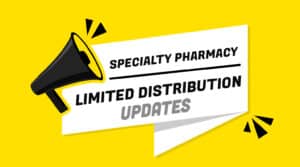Many are starting to question whether there will be a future for specialty pharmacy…. at least how we know it today. That being said, an optimist would say that even a buggy whip company could remain viable after the arrival of the automobile with enough innovation.
Specialty pharmacies don’t have mush room left to be innovative. Much of that innovation has already taken place with the emergence of advanced data management capabilities, integrated electronic health records to expedite and monitor patient status through artificial intelligence, tailored therapy-specific care management protocols, numerous operational efficiencies, etc. But one area still remains an opportunity for improvement and innovation, Value Based Initiatives.
The article below is a good overview of how and where specialty pharmacies may develop that innovation and ensure that their businesses will not go the way of the buggy whip company. “Working with patients, caregivers, prescribers, payers, and pharmaceutical drug manufacturers, specialty pharmacies promote value by coordinating care for complex health conditions across a diverse range of stakeholders and uniting patient touch points within a fragmented health care system.”
As the concept of value-based arrangements is evolving, the interest level by health plans is climbing. Value based deals are still tough to measure since results may need to be based on long timelines (years?) and metrics need to be precise (not easy…. but that’s where a specialty pharmacy can best participate, especially under the medical benefit which has historically been a black hole.)
The article spotlights a framework and five elements for specialty pharmacies to pursue.
— Understanding Shared Health Needs of Patients
— Designing Comprehensive Solutions to Improve Health Outcomes
— Integrating Learning Teams Measuring Health
— [Linking] Outcomes and Costs
— Expanding Partnerships
These elements add up to a more powerful model for specialty pharmacy that should be sustainable for the foreseeable future.
______________________________________________________________
How Specialty Pharmacy Will Thrive in the Value Era
2020-10-08 The era of fee-for-service health care is nearing an end. In its place, value-based initiatives seek to improve patient outcomes, reduce cost, and increase transparency in health care. These changes represent significant opportunity for specialty pharmacies to demonstrate their ability to create sustainable value across the health care continuum.
The Need for Value-Based Initiatives
The United States spends more per capita on health care than any other developed nation. According to the CMS, National Health Expenditures (NHE) in the US are predicted to outpace the growth of GDP through 2027 when health spending is predicted to exceed $6 trillion.
Despite spending the most, the US falls behind other developed countries in several key health indicators. The US has the highest incidence of chronic disease burden, the highest rates of obesity, and among the largest numbers of both preventable hospitalizations and avoidable deaths. Coupled with an aging population, rapidly expanding drug portfolios, and a fragmented health care system that tends to promote volume over outcomes, it’s clear why there is a push for change.
A Framework for Value
Michael Porter is a Harvard Business School professor whose extensive work in economics, strategy, and social causes has earned worldwide recognition. Porter and Elizabeth Teisberg wrote the book Redefining Healthcare, providing a widely accepted framework for a value-based health care system. They define value in health care as “The measured improvement in a patient’s health outcomes for the cost of achieving that improvement.”
In addition to defining value in health care, Porter describes a “paradox” in the US health care system which focuses on shifting cost and increasing bargaining power while restricting patient choice—none of which ultimately create value for the patient. Porter proposed a set of principles focused on high-quality, less costly care, improving value for patients, advancing unrestricted competition based on results, focusing on the full cycle of care, and value that is driven by provider experience, regional and national competition, transparency, and strongly rewarding innovation.
In a recent article in the Journal of the Association of American Medical Colleges, Teisberg et. al provide a strategic framework for implementing value-based health care. The framework includes 5 broad imperatives for value: understanding shared health needs of patients, designing comprehensive solutions to improve health outcomes, integrating learning teams, measuring health outcomes and costs, and expanding partnerships. These 5 imperatives have significant implications for health care delivery and defines a space where specialty pharmacy has opportunity to act as a driver of value within the broader health care system.
Value Based Care and Specialty Pharmacy
Specialty pharmacies are uniquely positioned to thrive in the era of value-based health care. Working with patients, caregivers, prescribers, payers, and pharmaceutical drug manufacturers, specialty pharmacies promote value by coordinating care for complex health conditions across a diverse range of stakeholders and uniting patient touchpoints within a fragmented health care system. Driving positive patient outcomes and managing costs are at the core of specialty pharmacy services.
As the Medicare Access and CHIP Reauthorization Act of 2015 and other federal legislation seeks to fundamentally change health care delivery and payment for health care services, specialty pharmacies are successful because of their proven ability to drive value in spite of the existing health “paradox” as described by Porter. Independently owned specialty pharmacies in particular are in a unique position in the current shift to value-based care because they are already organized around the imperatives as outlined by Teisberg while functioning outside of health systems and third-party payer organizations more closely tied to the fee-for-service system.
Specialty pharmacies align under Teisberg’s 5-point framework as follows:
Imperative 1: Understanding Shared Health Needs of Patients
Specialty pharmacies understand the unique clinical needs of patients with complex, often chronic health conditions and the drugs used to treat them. Specialty pharmacies build clinical programs with clinicians and staff who have extensive training and experience with specific disease states, drug classes, and comorbid conditions. Specialty pharmacists take the time to understand the unique clinical, psychosocial, and financial needs of the patient groups they serve, promoting continuity and establishing relationships based on trust and mutual understanding. Understanding the broad needs associated with a particular condition such as hemophilia or drug class such as IV/SC-Ig allows experienced clinicians to deliver targeted, individualized care to a specific group or groups of patients.
Imperative 2: Designing Comprehensive Solutions to Improve Health Outcomes
Specialty pharmacies use medication therapy management (MTM) to coordinate comprehensive care for patients and improve health outcomes. MTM employs a range of clinical tools to improve outcomes and promote value, including therapeutically focused clinical assessments, validated quality of life measures, detailed medication reconciliation, monitoring adverse effects, connecting patients to educational resources, peer-based support programs, and access to need-based financial resources reducing barriers to care. Specialty pharmacies provide patient level support reducing health system and therapy complexity by explaining benefits and coverage, coordinating the best site of care for injected or infused medication, providing drug administration training, adherence support, and resources empowering patients to independently manage complex, persistent treatment plans.
Imperative 3: Integrating Learning Teams
Specialty pharmacies leverage highly experienced, multi-disciplinary teams to promote value. By integrating clinical teams with intake, billing and care coordination specialists, specialty pharmacies speed access to care, remove barriers to treatment, and reduce therapy abandonment. Integrating clinical and nonclinical teams create synergies that do more than promote access and positive outcomes for patients. Aligning teams around shared goals creates a workplace culture focused on process improvement, cross-functional learning, and organizational efficiency.
Imperative 4: Measuring Health Outcomes and Costs
Specialty pharmacies have long been required to demonstrate their ability to improve outcomes and reduce cost to be included in payer networks, earn referrals from prescribers, and obtain Limited Drug Distribution agreements from pharmaceutical manufacturers. Specialty pharmacies are also required to measure outcomes to maintain accreditation from leading health care accreditation agencies. Specialty pharmacies employ sophisticated software and tools to track response to therapy, monitor dosing, utilization, and adverse effects while tracking costs. These tools allow pharmacists to deliver data-driven interventions, reducing unnecessary hospitalizations or adverse events.
Data collected by specialty pharmacies drive value across stakeholder groups: patients better understand the benefits and outcomes of their treatment plan, prescribers receive a complete picture of response to therapy for a patient or group of patients, pharmaceutical manufacturers discern insights into the efficacy of their product, and payers develop deep insight into cost and cost drivers for high-dollar health conditions.
Imperative 5: Expanding Partnerships
Specialty pharmacies work with an array of stakeholders across the health care continuum to drive value. In a fragmented health care system, specialty pharmacies use these partnerships to promote continuity and facilitate a better understanding of patient-level needs and experiences across stakeholder groups. By expanding partnerships with each of the traditional health care stakeholders and developing relationships in new areas, including patient advocacy groups, government organizations, and a growing digital health industry, specialty pharmacies have significant opportunity to improve patient care, scale operations, and reduce complexity in the health care system.
Toward a Better Future
Porter affirms, “Value in health care is determined in addressing the patient’s particular medical condition over the full cycle of care, from monitoring and prevention to treatment to ongoing disease management.”4
Specialty pharmacies will thrive in the era of value-based health care because their business model is already firmly centered in creating value. As health systems, independent physician practices, payers, pharmaceutical manufacturers, and patients navigate this new environment, specialty pharmacies are uniquely positioned to lead as a valued, experienced member of a multi-disciplinary, multi-stakeholder team facilitating a shift to a paradox free, value-based healthcare system.
JUSTIN LINDHORST, MBA,
BioMatrix Specialty Pharmacy.
Published 10/2020 Pharmacy Times






